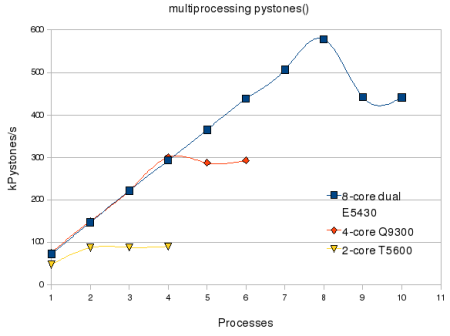A simple pystone benchmark using the python multiprocessing package. Seems to scale quite well - guess how many cores my machine has! 🙂
" Simple multiprocessing test.pystones benchmark "
" Anders Wallin 2008Jun15 anders.e.e.wallin (at) gmail.com "
from test import pystone
import processing
import time
STONES_PER_PROCESS= 10*pystone.LOOPS
def f(q):
t=pystone.pystones(STONES_PER_PROCESS)
q.put(t,block=True)
if __name__ == '__main__':
print 'multiprocessing test.pystones() benchmark'
print 'You have '+str(processing.cpuCount()) + ' CPU(s)'
print 'Processes\tPystones\tWall time\tpystones/s'
results = processing.Queue()
for N in range(1,processing.cpuCount()+3):
p=[]
q=processing.Queue()
results=[]
for m in range(1,N+1):
p.append( processing.Process(target=f,args=(q,)) )
start=time.time()
for pr in p:
pr.start()
for r in p:
results.append( q.get() )
stop=time.time()
cputime = stop-start
print str(N)+'\t\t'+str(N*STONES_PER_PROCESS) \
+'\t\t'+ str(cputime)+'\t'+str( N*STONES_PER_PROCESS / cputime )

is it better now?
get rid of the backquotes `` and use if __name__ = '__main' if you'd like others to be able to run this without errors and post their results.
'''Here is a slightly improved version that actually runs
Simple multiprocessing pystone.pystones() benchmark '''
''' Anders Wallin 2008Jun15 anders.e.e.wallin (at) gmail.com '''
from test import pystone
import processing
import time
STONES_PER_PROCESS= 10*pystone.LOOPS
def f(q):
t=pystone.pystones(STONES_PER_PROCESS)
q.put(t,block=True)
if __name__ == '__main__':
processing.freezeSupport()
print 'multiprocessing test.pystones() benchmarkn'
print 'You have '+str(processing.cpuCount()) + ' CPU(s)n'
print 'ProcessestPystonestWall timetpystones/stSpeedup'
results=processing.Queue()
for N in range(1,processing.cpuCount()+3):
p=[]
q=processing.Queue()
results=[]
for m in range(1,N+1):
p.append( processing.Process(target=f,args=(q,)) )
start=time.time()
for pr in p:
pr.start()
for r in p:
results.append( q.get() )
stop=time.time()
cputime = stop-start
if N==1: singlecpurate = N*STONES_PER_PROCESS / cputime
print "%utt%utt%.1ftt%.ftt%.1fX" % (N, N*STONES_PER_PROCESS,
cputime, N*STONES_PER_PROCESS / cputime,
N*STONES_PER_PROCESS / (cputime * singlecpurate) )
Thanks for the update, I spent some time changing it myself too. But my indentation got screwed up.
You wanted 8 cores, here it is 🙂
Xeon DP 2.66ghzx2 (E5430) = 8 cores total
multiprocessing test.pystones() benchmark
You have 8 CPU(s)
Processes Pystones Wall time pystones/s Speedup
1 500000 6.9 72727 1.0X
2 1000000 6.8 147449 2.0X
3 1500000 6.8 221729 3.0X
4 2000000 6.8 292912 4.0X
5 2500000 6.8 365283 5.0X
6 3000000 6.8 438340 6.0X
7 3500000 6.9 506806 7.0X
8 4000000 6.9 577868 7.9X
9 4500000 10.2 441739 6.1X
10 5000000 11.3 441384 6.1X
There is something going on with the quotes... I get a 'non ASCII-character' error with your program, but it runs OK if I change all the single-quotes to double-quotes.
Perhaps you're on a unicode-only system?
Thanks for the results, I've added them to the graph.
As a further exercise I'm thinking of comparing pystones or another benchmark using different speedup techniques, i.e. psyco, cython etc,
shedskin looks very interesting: http://code.google.com/p/shedskin/